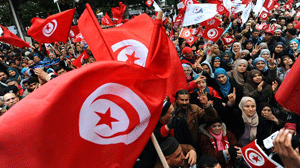The sociopolitical context for political reform in the Arab world is immensely challenging. As a result, few Arab countries have an easy way to democracy. But miraculously, Tunisia has already shown the start of a genuine Arab awakening.
This homogeneous North African Arab country was the first to mobilize public dissent peacefully, to oust its oppressive ruler, rather easily. It then ran a free election, formed a pluralist government and created a liberal constitution through a nationwide, painful and rancorous debate, not so easily. More significantly, after the departure of Zine El Abidine Ben Ali, Tunisia succeeded in replacing a new Islamist-led government, which failed to bring about the expected post revolutionary reforms, with a secular government. Still, the new government has allowed Muslim representatives to share power in a pluralist cabinet. Elections for a new president and national assembly are scheduled to take place this year. To be realistic, Tunisia is not yet immune to reactionary forces.
Consider the contrasting “Arab Spring” developments in Egypt. In early 2011, dramatic street demonstrations ousted President Hosni Mubarak, a secular dictator. A democratic election, the first in the country’s history, ushered in the rule of the Muslim Brotherhood, which did not live up to the aspirations of the people. A second wave of massive protest led to the replacement of the Brotherhood with a secular, interim government dominated by the military. The new regime has so far failed to introduce reform.
A third round of revolutionary change may take place in Cairo at any time in the foreseeable future. For the moment, Egypt relies on Arab Gulf money to sustain a discouraging political status quo: an authoritarian regime suppressing an Islamist opposition under the pretext of protection of national security.

How long will Saudi Arabia be able to finance the military regime in Cairo? How effective will the Muslim Brotherhood be in its opposition to the status quo? And how long will it take for Egyptians to unite on a human rights-based agenda?

How long will Saudi Arabia be able to finance the military regime in Cairo? How effective will the Muslim Brotherhood be in its opposition to the status quo? And how long will it take for Egyptians to unite on a human rights-based agenda?
Libya presents another depressing story. The regime that replaced brutal leader Moamar Gaddafi has not been effective in bringing back stability and reform to this oil-rich country. Libyan tribal and militia culture is politically corrosive.
In Yemen the prognosis is even worse than in Libya. A tyrannical president was replaced by his vice president after covert Saudi and American diplomatic intervention. The country remains deeply divided- ethnically, geographically and ideologically- and highly unstable.
In Syria, the Arab Spring has morphed into a civil war backed by blunt as well as covert regional and international intervention. Syria’s conflict could last for years as long as Saudi Arabia and Iran continue to confront each other on Syrian soil.
Back to Tunisia. What makes this state a winner in the Arab Spring?
Consider the contrast between Tunisia and Egypt in the social context of the Arab Spring. Four factors stand out. While Egyptian society is too obedient to religious authority, particularly on matters of family and gender laws, Tunisians respect their clerics without bowing to them. While the military in Egypt controls a major portion of the economy, the armed forces of Tunisia do not dabble with big business or manipulate politics. The economy is a major, favorable factor in the smaller country: only 5 percent of Egypt’s land is fertile, whereas in Tunisia two thirds of the land is cultivable. In Tunisia, civic society is vibrant and political parties are active. This is not the case in Egypt, where the government inhibits social and political enterprise.
Political contrast is also significant between Tunisia on one hand, and Libya, Syria and Yemen on the other. Despite the corruption and oppression of the Ben Ali regime, and the authoritarian rule of former President Habib Bourghiba, Tunisia has never been led by a severe iron fist. But in Syria, Libya and Yemen the rulers have been consistently harsh and merciless. Tribal and sectarian divisions in those three countries are strong but subservient to their dictators. Tunisia has not been vulnerable to tribal or sectarian strife. Ninety eight percent of Tunisia is Sunni.
Tunisia will undoubtedly face challenges and reversals in its march toward full democracy. But as long as the religious and military establishments remain distanced from politics, the country will find its way forward.
If Tunisia continues on the path of democracy over this decade it would be a compelling regional model for state building. Since the collapse of the Ottoman Empire in 1918, the Arab world has been copying modernity from the West. It is time for the Arabs to build their own paradigm of social change. Tunisia may not be the only model, but it will hopefully be one pattern to stimulate reform among neighbors. Once Egypt gets its act together, it may provide another road map for countries that are overpopulated, deeply religious and economically challenged.
The Arab Spring will take time.
— Ghassan Rubiez is an Arab-American social scientist, who has spent much of his life working in and around the Middle East.






Leave a Reply